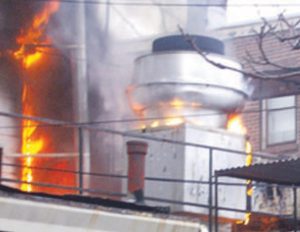In the world of commercial kitchen safety, adhering to the NFPA 96 fire code standards is non-negotiable. These guidelines, set forth by the National Fire Protection Association, are designed to reduce the risk of fires in restaurant kitchens. At Crossfire Hood Cleaning, we specialize in helping your kitchen meet these critical safety standards. Below, we delve into some of the pivotal aspects of NFPA 96, explaining their significance and how we ensure your establishment remains compliant.

Fan Access Panel
NFPA Fire Code #96: 8.1.5.3.1
“Upblast fans shall be supplied with an access opening of a minimum 76 mm by 127 mm (3 in. by 5 in.) or a circular diameter of 101 mm (4 in.) on the curvature of the outer fan housing to allow for cleaning and inspection of the fan blades.”
Electrical Wiring/Fan Hinge
NFPA Fire Code #96: 7.8.2.1
“Rooftop terminations shall be arranged with or provided with the following:
(8) A hinged upblast fan supplied with flexible weatherproof electrical cable and service hold-open retainer to permit inspection and cleaning that is listed for commercial cooking equipment..”
NFPA Fire Code #96: 8.1.1.1
“Approved upblast fans with motors surrounded by the airstream shall be hinged, supplied with flexible weatherproof electrical cable and service hold-open retainers, and listed for this use.
NFPA Fire Code #96: 9.2.1
“Wiring systems of any type shall not be installed in ducts.”
Rooftop Grease Containment
NFPA Fire Code #96: 7.8.2.1
“Rooftop termination shall be arranged with or provided with the following:(4) The ability to drain grease out of any traps or low points formed in the fan or duct near the termination of the system into a collection container that is noncombustible, closed, rainproof, and structurally sound for the service to which it is applied and that will not sustain combustion
(5) A grease collection device that is applied to exhaust systems that does not inhibit the performance of any fan
(6) Listed grease collection systems that meet theses requirements.”
NFPA Fire Code #96: 8.1.1.3
“Upblast fans shall have a drain directed to a readily accessible and visible grease receptacle not to exceed 3.8 L (1 gal).”
Inspection & Cleaning Frequency
NFPA Fire Code #96: 11.4, 11.6.1, 11.6.2
“The entire exhaust system shall be inspected for grease buildup by a properly trained, qualified, and certified company or person(s) acceptable to the authority having jurisdiction and in accordance with Table 11.4”“Upon inspection, if the exhaust system is found to be contaminated with deposits from grease-laden vapors, the contaminated portions of the exhaust system shall be cleaned by a properly trained, qualified, and certified company or person(s0 acceptable to the authority having jurisdiction.”
“Hoods, grease removal devices, fans, ducts, and other appurtenances shall be cleaned to remove combustible contaminants prior to surfaces becoming heavily contaminated with grease or oily sludge.”
NFPA Fire Code #96: 11.4, 11.6.1, 11.6.2
“The entire exhaust system shall be inspected for grease buildup by a properly trained, qualified, and certified company or person(s) acceptable to the authority having jurisdiction and in accordance with Table 11.4”“Upon inspection, if the exhaust system is found to be contaminated with deposits from grease-laden vapors, the contaminated portions of the exhaust system shall be cleaned by a properly trained, qualified, and certified company or person(s0 acceptable to the authority having jurisdiction.”
“Hoods, grease removal devices, fans, ducts, and other appurtenances shall be cleaned to remove combustible contaminants prior to surfaces becoming heavily contaminated with grease or oily sludge.”
Table 11.4 Schedule of Inspection for Grease Buildup
Type or Volume of Cooking Inspection
| Monthly |
|
| Quarterly |
|
| Semi-Annually |
|
Compliance with NFPA 96 is vital for the safety of any restaurant kitchen. Crossfire Hood Cleaning is here to ensure that your establishment meets these critical standards, providing professional cleaning and maintenance services tailored to the unique needs of your kitchen. Stay ahead in fire prevention and ensure the safety of your staff and patrons with our expert guidance and services.
Let’s get and keep your restaurant grease free to prevent fires

